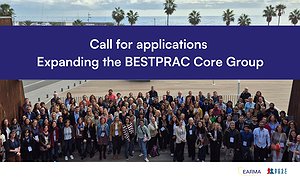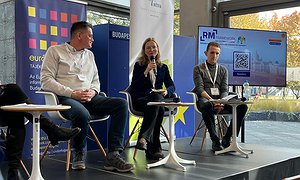Promoting European cooperation in developing responses to research security challenges
Operationalising “research security” measures has become a defining challenge for research organisations and is one that disproportionately affects research managers as the need for enhanced due diligence and engagement with regulatory compliance measures increases significantly.
In recent years, governments in the United States, Canada, Australia and the United Kingdom have introduced legislation to protect the system of international research collaboration from hostile actors who might seek to undermine it.
In January 2024, the European Commission Council Recommendation on Research Security highlighted the need to enhance research security across Europe and outlined the creation of a European centre of expertise on research security, the development of tools to support research organisations and consistency of approach, as well as plans to change the EU’s dual-use export regime.
The presenters authored the ARMA UK ‘Complex Collaborations’ report in which they found that research organisations in the UK are experiencing unprecedented challenges relating to the complexity and cross-cutting nature of national research security guidelines and the underpinning legislation. The report, which engaged research managers and funders across the UK and international stakeholders in the USA, Canada and Australia, identified a need for immediate action that offers practical solutions to stakeholders at every level, in addition to longer-term responses and cultural change.
The authors of the ‘Complex Collaborations’ report, Jennifer Johnson, Sapna Marwaha, Linsey Dickson and Joe Timlin, bring specific expertise on research security matters in the UK and international contexts having engaged with research managers and sister societies in Denmark, Italy, France, Sweden and Central Europe through Science and Innovation Network and Universities UK International events, presented at SRAI and CARA conferences, and delivered international research security events in countries including Malaysia and Chile, in addition to holding research compliance leadership roles in UK Universities.
The aim of this event is to build links in the European research management community in operationalising national research security guidelines and compliance measures. By sharing knowledge of national policy and practice in due diligence and research security matters, this event will establish a basis for further collaboration to build the capacity of research managers and mitigate research security risks in international research collaborations.
Registration
You can register to attend by filling in the form.
Event details
Date: Tuesday April 23, 2024
Location: Odense, Denmark
Draft Agenda (further details to be added)
09:30 – 10:00 Registration, networking and refreshments
10:00 – 10:15 Introduction
10:15 – 11:00 Session 1 – Why do research managers need to know about research security?
Sapna Marwaha, MD of Formation Consultancy Limited and Deputy Chair of ARMA, will lead an introduction to the UK policy and regulatory landscape
Laura Schierff, Team lead, Centre for Innovation and Knowledge Security, Danish Security and Intelligence Service (PET) will provide an overview of the challenges that policymakers are trying to address
We will have two short presentations from the speakers followed by a Q&A with the audience.
11:00 – 12:00 Session 2 – How are research organisations responding to the challenges of research security?
Rachel Beaton (she/her), Research Integrity and Governance Manager, Research, Innovation and Business Engagementat the University of Stirling will lead a discussion on how research organisations across Europe and beyond, are responding to the research security agenda.
Dominique Michaud, President, Présidente of CARA/ACAAR and Director of Research and Business Development at Concordia University, Canada will give a presentation regarding the Canadian response to these challenges.
12:00 – 12:45 Lunch and networking
12:45 – 13:45 Session 3 – Developing tools and resources to support implementation
Joe Timlin, Trusted Research Manager at Loughborough University, will lead a session providing an overview of the ARMA UK Complex Collaborations report and recommendations with a focus on developing protocols and approaches to support the implementation of research security controls.
13:45 – 14:00 Break
14:00 – 14:45 Session 4 – Discussion: Exploring opportunities for capacity strengthening and collaboration
Interactive session with facilitated discussions designed to explore topics of interest to European research managers and opportunities for further capacity strengthening and collaboration.
14:45 – 15:00 Closing remarks
UK delegates
Sapna Marwaha founded Formation Consultancy, where she brings together her skills as a lawyer, research and innovation manager, trainer and facilitator to support universities and research organisations to respond more effectively to the challenges of an increasingly complex regulatory environment. Sapna is also deputy chair of the Association of Research Managers and Administrators and was a co-investigator in the Complex Collaborations project that explored research security responses in UK institutions. Prior to establishing Formation Consultancy, Sapna gained a decade of experience advising higher education institutions and research funders as an inhouse lawyer specialising in research, innovation and compliance matters. Sapna has led legal teams and the design and implementation of research due diligence processes, as well as systems-based solutions to legal and compliance activity within research intensive university and funder environments.
Joe Timlin is Trusted Research Manager at Loughborough University, with responsibility for a range of complex international partnerships and implementing Trusted Research principles and research compliance measures including export control and the National Security and Investment Act. Joe has worked in research management for 6 years and has acted as Project Officer and co-authored two UKRI-funded, ARMA UK reports, ‘Complex Collaborations – Efficiency, Equity, Quality and Security in International Research’ (March 2023) and ‘Due Diligence in International Research – Options for Improved Efficiency, Equity and Quality’ (April 2021).
Funding for this project is provided by the UK Science and Innovation Network’s Research Security Programme.

 All news
All news



